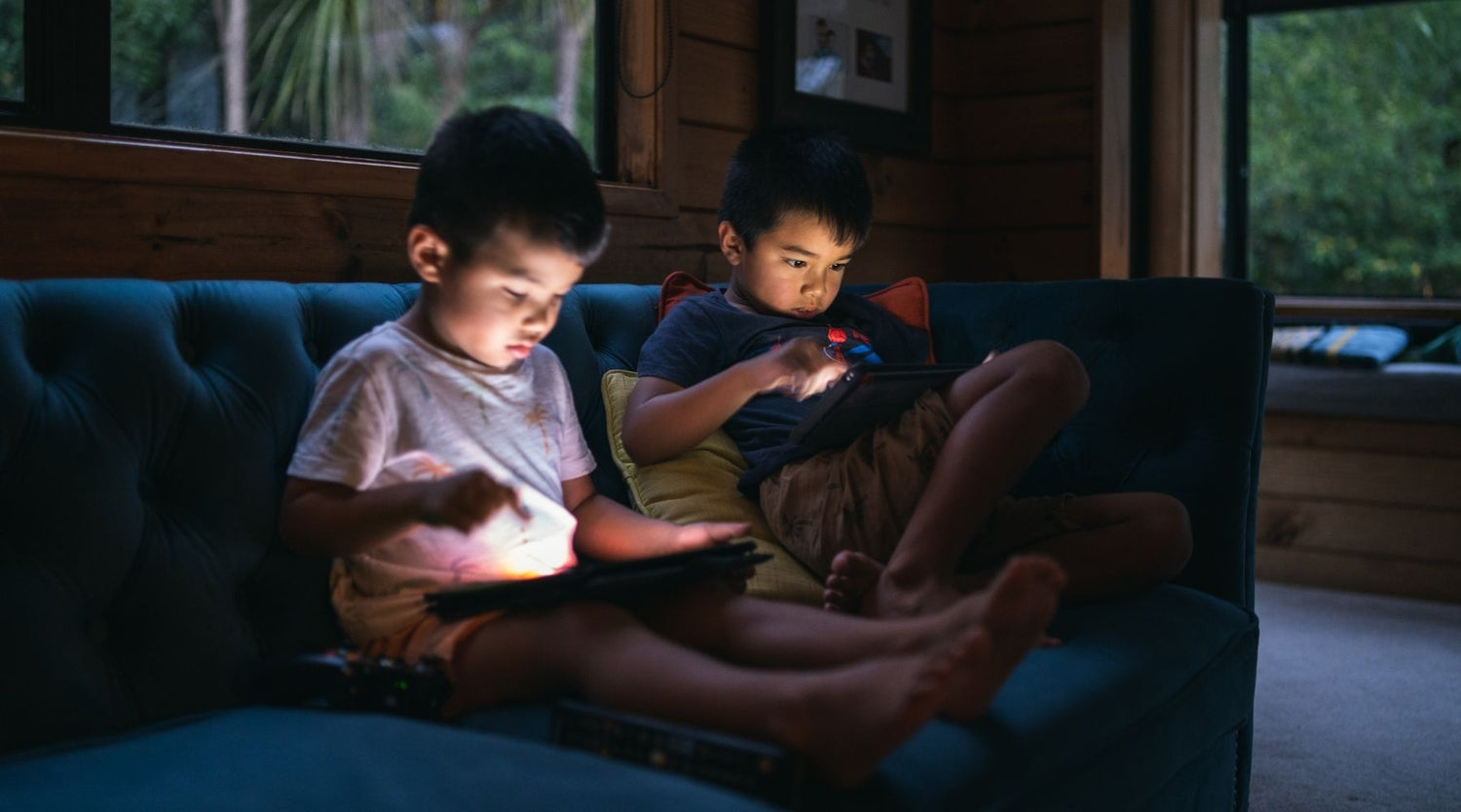
Realistic Screen Time Limits Worth Everyone's Time
Establishing Screen Time Limit with Kids
Power struggles, behavior, mental health, and staggering statistics are few reasons parents have been motivated to reassess their kids' screen time limits and change them. If you’re feeling like you’d like to change your expectations and establish better screen time limits, you can - it’s not too late.
As the parent and the adult in this relationship, you can make changes when you recognize that your current expectations are not working well. When you notice that problems are typically occurring around the same time every day with the same situation (screen time), you can identify the pattern and intentionally teach a different expectation.
Unknown Territory
If you were dropped off in a country you’d never been to and were expected to navigate your way around with no help, you’d feel lost.
Over the past 15 years many parents experienced this feeling as their kids were introduced to new technology in a device-driven world. As parents were thrust into this unknown territory that they didn’t grow up in, they were expected to navigate their kids.
A harmful cycle developed as kids were given additional access to a variety of devices. Screen time increased, as well as entitlement issues, addictions, and mental health concerns.

Option Overload
Our kids are growing up in an option overload environment. Unlike any other time in history they have access to all types of information and entertainment at their fingertips.
Having unlimited access to screens can literally affect their mental, physical, social, and emotional development. Understanding the importance of healthy development can motivate parents to make it a priority to establish screen time limits.
Parents may feel overwhelmed by enforcing screen time limits with their kids, but despite the task at hand, they should make it a priority.
When kids are guided with healthy screen time limits, they can learn to manage their time wisely rather than develop entertainment entitlement.
Assign a Time
Assign specific times when your kids are allowed to have screens.
Involve your kids in setting up specific times. As they become part of the solution, they are more likely to abide by the new expectations for your family. Be clear about times when screens are allowed and times when they are not.
Setting up a specific plan with your kids will be worth your time.
Gather your family together around a special treat. Set up this conversation to be special and different from others. If necessary, have some paper and colored markers to write down ideas.
If you feel your kids have had too much screen time, let them know that expectations are changing and they get to be part of the new plan! Inform your kids that some important changes need to be made, because the screen time is out of balance. In order to create better balance, your kids need to be involved in unstructured play that does not involve screens. You could write ideas they could choose when screens are not an option.
- Play outside
- Practice a skill or sport
- Bake something
- Draw/color
- Invite a friend over
- Go on a bike ride
- Paint rocks
- Jump on the tramp
- Shoot hoops
- Skateboard

At a young age it may only be a certain time of the day or day of the week. Set a timer and be consistent. Teach your kids how to appropriately respond when their screen time is over. You could expect them to say, “Ok” and shut the device off. Let them know that their good attitudes will allow them to have additional opportunities next time.
- Assign a time.
- Teach the expectation.
- Set a timer.
- Be consistent with screen time limits.
- Follow through when necessary. If they don’t get off when their time limit is up, they may lose the opportunity for a turn next time.
As kids grow older and exhibit emotional maturity, they may be given more freedom to self-regulate their time by managing a cell phone responsibly.
Discuss the screen time limits and expectations with your family. Educate them about the importance of living a fulfilling life by spending time outside, serving, playing, developing talents, and creating, rather than constantly consuming entertainment.

The online positive parenting course, Lead, Guide, Walk Beside: Parenting with Purpose can guide you in setting up new expectations, while also strengthening the relationship with your kids.
Recommended Articles:
Positive Parenting Techniques to Implement Immediately with Online Course
Is Your Teen Ready for a Cell Phone?
Unstructured Play
Kids who have unstructured play without screens, have more opportunities to develop their executive functioning skills, enhance creativity, and build self-esteem.
Unstructured play is encouraged by the American Psychological Association to promote healthy development.
Studies revealed that critical thinking skills are developed at a greater rate when kids engage in unstructured play.

Why does this truly matter?
Researchers have found that executive functioning skills in childhood can predict important life outcomes.
When parents understand the value and importance of unstructured play, they can allow space for their kids to have it. Even though parents may know unstructured play is important, kids who are used to being entertained may have a hard time knowing what to do with their time.
Parents can strategically leave out supplies or toys for their kids to come up with their own ideas and play.
- Sheets for forts
- Easily accessible art supplies
- Playdough
- Open-ended toys
- Musical instruments
Instead of putting everything out at once, rotate through options that are available.

It’s Never Too Late to Change Expectations
“You’re welcome to play a game on the computer for 30 minutes when your schoolwork is finished.”
We thought our screen time limits were good, but we were mistaken. A 30 minute turn on the computer turned into 2 hours of screen time. It was never just 30 minutes, because they would play their 30 minute game, then sit and watch their siblings play. Four kids at 30 minutes each ended up being 2 hours!
Once we realized the pattern, and the desire we had for them to do more than come home and look at a screen, we changed the expectation.
We emotionally prepared ourselves for their disappointment. We knew that additional screen time limits would not be welcomed news. We moved forward with confidence, they complained, we stayed calm.
The next part is when magic happened. Once the new screen time limits were set, they moved on and chose to do other things. They played together more, engaged in imaginative play, and played outside.
If You Can, Start Early
While at my daughter’s 9 month check-up in 2006, I was surprised to hear the pediatrician talking about the importance of limiting screen time. TV screens were my only thought, and I felt like we were doing well by only allowing about 30 minutes a day of Baby Einstein DVDs.
Little did I know, additional screens were on the brink of evolving and would be a constant fixture in the world she would grow up in.
Screens had taken on a whole new meaning. By 2007 the iphone was introduced, and on its heels, the ipad in 2010. Kids were given access to hand-held devices for constant entertainment. I even heard some parents refer to an ipad as “The babysitter.”
New inventions came with new challenges.
Instead of walking through a store and hearing parents interact with their kids, I would often see kids holding their own devices to be entertained wherever they were; at home, at the grocery store, and at restaurants. My heart ached for missed opportunities of interaction at such a critical age of development.

More Than Advice
I always remembered the pediatrician’s advice, and committed to limit screen time in our home. Over the years adjustments were made and we limited screen time even more. We’ve never regretted it.
Her advice became more than advice about screens, it assisted us in building a family culture where we have unstructured time and healthy limits. My husband recently told me that limiting screen time was one of the best parenting decisions we ever made.
Motivated!
From close friends, family members, and participants who attended my positive parenting course, we witnessed an undeniable trend of parents desiring more guidance with limiting screen time with cell phones. They wanted to change expectations, but didn’t know how.
We were motivated to create Phone School, an instructional program to guide kids/teens to healthily manage a cell phone.
Familiar Territory
Enough time has passed and we have seen devastating effects of allowing kids to have too much access to screens.
This time you’ve been dropped off in a country you’ve visited before, with systems set up to guide you. You have more knowledge, more confidence, and can make better decisions.
You understand the importance of setting screen time limits and are committed to implement them for the benefit of your child right now, their ongoing development, and their future.
Products
View all
